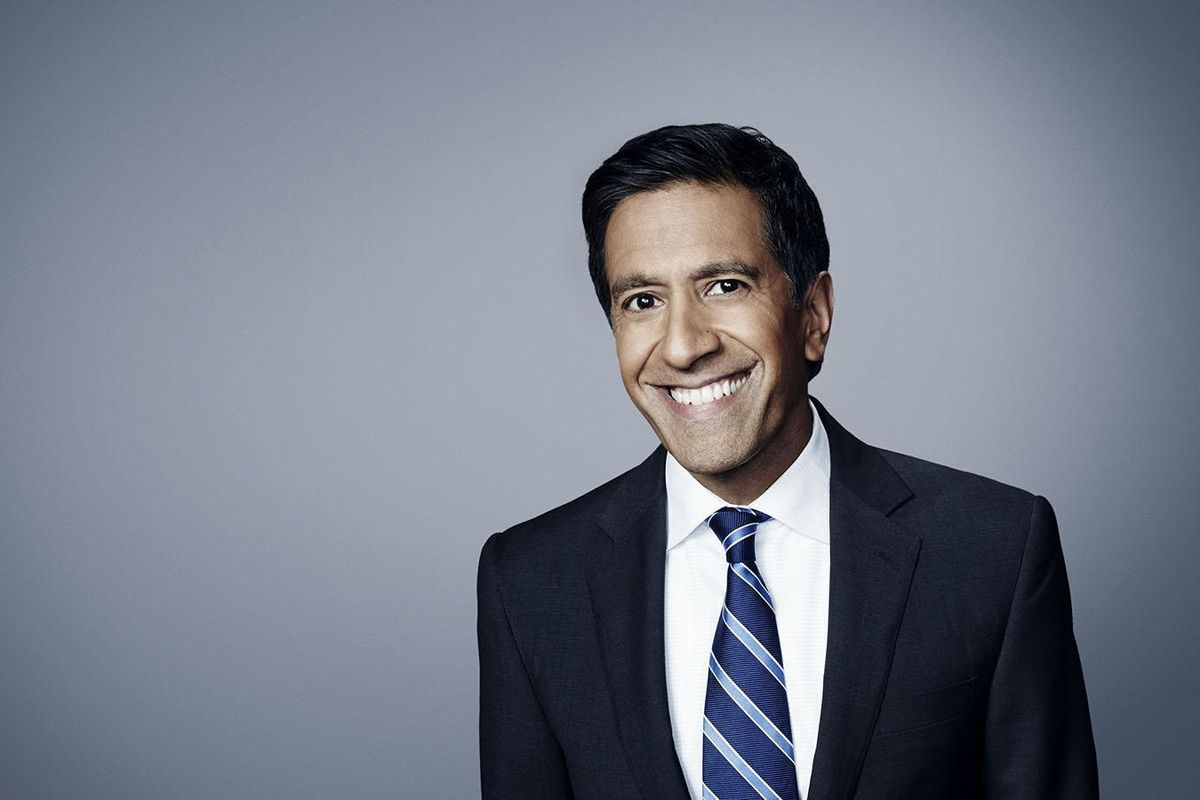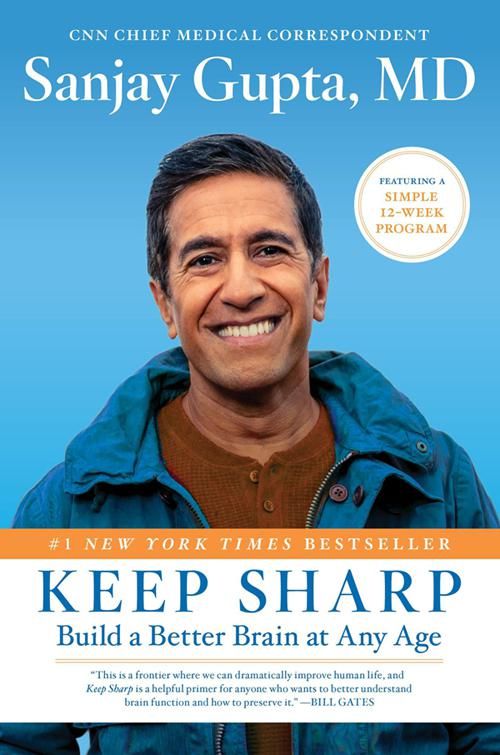Dr. Sanjay Gupta recently took time out from his hectic schedule to speak with HealthyWomen's editor-in-chief, Jaimie Seaton. An award-winning journalist, CNN's chief medical correspondent, professor of neurosurgery and practicing neurosurgeon, Dr. Gupta discussed his new book, “Keep Sharp: Build a Better Brain at Any Age" with Seaton. The book explains the connection between the brain and overall health; debunks common myths about aging and cognitive decline; discusses the signs and symptoms of brain disease, including Alzheimer's; and offers a detailed 12-week program to strengthen brain health.
This is the first part of a two-part series. Be sure to read the second partof our interview, too.
The transcript has been lightly edited for clarity and length.
HealthyWomen: In the book, you talk about your family's experience with dementia. Can you talk a bit about that and why you wrote the book?
Dr. Sanjay Gupta: There were two main reasons. One was very personal, as you point out. We have Alzheimer's in our family, and I saw firsthand as a young person what was happening to my grandfather's brain and that really stuck with me. We talk about diseases — heart disease and lung disease — things like that. With a brain disease, the idea that your personality can change, who the person is, the way you interact with them can be so different, it was quite jarring actually. But the other thing was, just as a neuroscientist, there were all these remarkable things that we are learning about the brain over the last decade and a half, not the least of which is that you can grow new brain cells throughout your entire life. Some of that is new knowledge, and it wasn't yet widely known to the lay public. So, those two things in particular, my long-standing fascination with the brain for personal reasons and the fact that there was genuinely authentically new knowledge that was coming out that I thought was worth sharing.
HealthyWomen: In the book, you write eloquently about the first time you operated on a brain. Can you talk about that experience and how it has shaped your work since then?
Dr. Sanjay Gupta: You never forget the first time you actually operate on the brain. You go through this process where you make a skin incision, you have to remove bone and the outer layers of the brain, and then you're basically looking at the brain itself. And it's just so delicate, it's soft. I don't know what I expected necessarily, but you kind of feel like it would be tougher for all that it does, that it would put up more of a fight. You can manipulate it so easily once you're actually there. But then the other thing is, every single time I've operated on the brain, including the first time, there is this idea that it's mystical, like how can love and anger and pain and things like that all exist in tissue like that? You wouldn't look at the spleen and say, "Well, that has a reservoir of consciousness," so why does this tissue, which is what it is, 3 pounds of tissue. How does it contain sentiments like that?
So it was a very physical reaction in terms of the process of operating on the brain, but also this mystical feeling, and I think in terms of how it's shaped me since then. I'm very humbled by it every time. I'm very cognizant of the fact that everything about that person's identity is wrapped up in the operation that I'm doing on them. So it's not just that they may have an incision on their chest or their abdomen afterwards, their brain may be different somehow and they will be different as a result. And I take that very seriously.
HealthyWomen: I want to get right into the advice of the book. Can anyone build a better brain, and is it possible to reverse or slow the progression of dementia or Alzheimer's disease?
Dr. Sanjay Gupta: Neurogenesis, the birth, the creation of new brain cells is possible for anyone. And that sounds like a simple statement, but up until fairly recently, it was really only thought that babies as their brains were forming or maybe someone after an injury, such as a traumatic brain injury or a stroke, were the only times that the brain was building new brain cells. It was more recently we learned that this neurogenesis can happen throughout your entire life, which is a remarkable thing. I think there is always this idea that we age, we wear and tear, things start to lose function, and I think that there is a degree of truth to that, but I think the brain is maybe the only organ that can reliably grow sharper and stronger and have neurogenesis throughout its entire existence.
So yes, I think at any age, anyone can build a better brain. For most people, we use 10-20% of our brain, 80-90% of the time. It's basically like living on planet Earth and just living in your own city, never traveling. That's kind of how we look at our brains. So that gets to your second question, this idea of slowing or reversing the progress of dementia. I don't want to overembellish what is possible, so I would put it to you like this: If we're using 10-20% of our brain 80-90% of the time, we never travel. Using travel as a metaphor, if you start to travel and you learn different roads and you learn different cultures and different languages and different things, when your city that you live in has problems, maybe the roads need construction, or there's blockages, all of the sudden, you have all these other routes to still get you from point A to point B.
Does your brain still have plaques associated with Alzheimer's or tangles associated with Alzheimer's? Probably, but does it have an impact on your cognitive function? Much less so because you have so much of this cognitive reserve that you get by exploring all these other cities in the brain.
So, the metaphor is that the exploration of all these other cities is the neurogenesis, as you're exploring new areas, you're building new towns and roads in those areas. Metaphorically, it's just fun to travel to other cities, but it also provides you protection later because you have all these other pathways to allow your brain to continue to function well. We think about this with the heart pretty easily. You're always building new blood vessels, so if one of the main blood vessels gets blocked, it's not that it's not blocked, it is. And it's not that you don't have heart disease, you do. But you have these other areas for blood to travel so that the area of the heart muscle doesn't go without blood flow, you can think of that same concept with the brain.

(Photo/Simon & Schuster)
HealthyWomen: There are a lot of products out there claiming to boost brain health, including games and supplements. What role do they play, if any, in building a better brain?
Dr. Sanjay Gupta: We looked at this evidence pretty diligently, both in the United States and around the world, and I think it's hard to point to any particular supplement and say that it has a meaningful impact on cognitive function. I'm careful because I think the old adage that absence of evidence does not mean evidence of absence does apply here. There may be something that comes out that basically is particularly good for brain health. I don't think we have the evidence on that yet, and we looked hard for it. I think if people have nutritional deficiencies, vitamin D deficiencies, other deficiencies, making sure that they have those levels normalized, that can be beneficial. With regard to games, and I put crossword puzzles in there, I think that they can be really useful, but maybe not for the reasons people think.
If we use that city analogy again, games make you really good at being able to get around your city well; you don't need GPS. You know the roads like the back of your hand. It's the "practice makes perfect" part of your life. That's what the games and the crossword puzzles do. But again, if those roads become blocked because of disease later on, then no matter how good you are at navigating the road, if it's blocked, you're sort of out of luck — which is why I think even more important than the games and the crossword puzzles is to simply do new things, because that's part of building the new roads and visiting the new cities.
HealthyWomen: As you know, women have a tendency toward multitasking and feeling guilty for not getting more done. Can you talk a little bit about the role each of these play in brain health?
Dr. Sanjay Gupta: First of all, I think guilt has very little benefit. It's not a useful emotion, either for productivity or for brain health. As far as multitasking goes, I think the thing that was most remarkable to me was, when you look at these studies that basically determine how much energy you are actually utilizing to accomplish tasks, the bottom line was that you were less efficient when you multitask, and the reason was that it actually took a fair amount of energy to toggle between one activity to the other, and that was the big takeaway for me. People tend to go back and forth on tasks very quickly, and it's all in the pursuit of increased efficiency. And I think the science is pretty clear now that multitasking, while it seems like a very reasonable thing, is just not efficient.
Some people have no choice, they have to pick up their kids, they have to make a call to the dentist at the same time — they have to do things simultaneously — so I'm not dismissing that, but if it's in a pursuit of efficiency, it's not particularly good from a brain standpoint.
In the second installment of our interview, Dr. Gupta discusses the socioeconomic aspect of brain health; the links between obesity, isolation, and Alzheimer's; and the lasting effects of COVID-19.
Read more
Alzheimer's Isn't Inevitable
Does Forgetting a Name or Word Mean That I Have Dementia?
Racism Linked To Cognitive Decline in African American Women
Retiring Early Can Be Bad For the Brain
From Your Site Articles
Related Articles Around the Web








